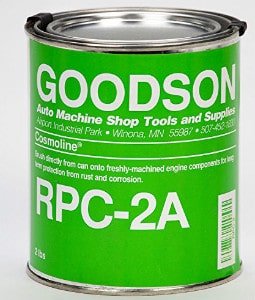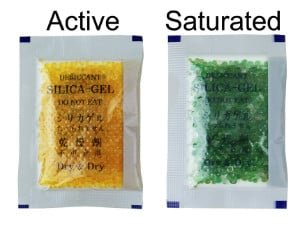It’s been said that a gun only has 2 enemies: rust and politicians. While there are things you can do to protect your guns from poor legislation on capitol hill, preventing rust is much easier and more under your control. Rust is one of the quickest ways to ruin your new firearm, and it accumulates both quickly and easily. Thankfully, preventing the accumulation of rust on your firearms is relatively easy, and there are multiple methods and products out there to help keep your firearms clean, rust-free, and functioning properly. If you are ready to dive into the best products and methods to ensure your firearms are in tip-top shape, then keep reading!
Related Articles:
- Learn Here: Gun Lubrication 101 [Know Your Stuff]
- Gunk? How to Remove Rust From a Gun [Clean]
- Safety First! How to Use a Gun Cleaning Kit [Instructions]
- Don’t Overdo It! Can Guns be Over Cleaned? [Right Tools]
- Question: How Often Should You Clean Your Guns? [Like New]

Related Buyers Guides:
What Is Rust?
Before we tackle how to prevent rust, we need to know exactly what rust is, and what causes it. Rust, or iron oxide, is what happens when the metal components of your gun react with oxygen to turn from iron into iron oxide. Iron oxide is the ugly, dangerous powder that forms on the surface of your metal gun parts. While it is possible for rust to eventually happen with nothing but the oxygen in the air, there are a number of things that can act as catalysts to this reaction and cause rust to magically appear in a matter of minutes.
Corrosive Ammunition
The least common of these items are corrosive chemicals, primarily in the form of primers that produce corrosive compounds upon ignition. These are fairly common in much older military surplus ammunition. As long as you stick with new production or hand loaded ammunition, you will be fine. For those of you that elect to shoot corrosive ammunition, you can still do so safely, provided you immediately give your gun an extensive cleaning after you are done with your range time. I would recommend following the cleaning instructions found here to ensure that your firearm is taken care of and put away safely.
Contact With Water

The most common way that rust forms are by contact with water. Now, most of us aren’t going to leave our firearms laying around in a puddle, but there are numerous other ways they can come in contact with water. Using water for cleaning is a big one. This can be an especially big problem if you use an aqueous solution in your ultrasonic cleaner. Ultrasonic cleaners are great for removing stubborn gunk from hard to reach places, but you will need to make extra sure that you get your parts clean and very dry before continuing with the cleaning and rust protection process. For this reason, I usually like to avoid using water in my cleaning regimen as much as possible. If I need to flush out a part with large volumes of solvent, I like to use brake or carburetor cleaner. This is not only more effective than water, but it won’t leave droplets behind that can cause rust. The only exception to this is when I am cleaning a newly imported military surplus firearm (such as a Mosin-Nagant rifle or an SKS carbine) out of cosmoline. The fastest and easiest way to to do this is with large volumes of scalding hot water.
High Humidity
This leaves us with the easiest ways that firearms come in contact with water: humidity and condensation. When it comes to rust prevention, these are 2 major factors you will want to control. For starters, let’s look at humidity. This is going to be primarily a regional problem. Those that live in the desert will probably not have much to worry about, but those in tropical regions certainly will. I happen to live in the midwest, where humidity can be a huge problem. It’s not uncommon at all for humidity to reach 100% during the summer. With levels like that, it doesn’t take long for problems to form! If you can control the humidity, it will go a long way to keeping rust off of your guns
More Related Articles:
More Related Buyers Guides:
Condensation
If you live in an area that can see large fluctuations in temperature, then you are going to be very susceptible to condensation. Condensation happens when warm, moist air comes in contact with something cold (just like how your cold beverage will “sweat” on a hot day). This causes the moisture in the air to condense and collect on the surface as water. This is obviously very undesirable and is one of the quickest ways to acquire rust. Thankfully, controlling the temperature and humidity will all but eliminate this problem.
Ideal Storage Conditions

In order to be the most effective at preventing rust, you will want to store your firearm in a cool, dry place. If you want to be very precise about it, the NRA National Firearms Museum keeps their collection stored at a constant 70 degrees, and 50 to 55% humidity. For most people, this level of precision is not easily attainable, so as long as you store it in the driest place you have and sufficiently protect your metal, you will be fine. You will want to avoid places like attics, garages, and the trunk of your car. It’s also a good idea to avoid leaving your guns in their cases, as these can often act as traps for moisture and cause rust.
Oil
The first, and easiest line of defense against rust is going to be a light coat of oil. We all know that oil and water don’t mix, so naturally, you can assume that by covering all of your metal components with oil, it will keep water from contacting the surface of your metal. Giving your firearm a good coat of oil has multiple benefits apart from rust prevention as well, as oil is a great lubricant. Using oil does have its downsides, however. Oil can be very messy, and it’s not good to use on all of your gun parts (parts that slide will benefit more from a good grease). It can also attract dirt and fouling. There is a very fine line to walk when using oil: too much and it will collect gunk and make a mess, too little and you are at a greater risk of rust and malfunctions. Overall, oil is almost a basic requirement for your firearms, but it should not be your only form of rust prevention.
Long Term Rust Prevention
Cosmoline
If you enjoy collecting or working with military surplus firearms, then you are no doubt familiar with this gooey substance. When old military firearms (such as Mosins, Mausers, and the SKS) were put into long-term storage, they were dipped into a huge vat of cosmoline. Cosmoline is a jelly-like substance that is pretty similar in consistency to vaseline. At room temperature, it is very thick and viscous, but once heated it becomes very runny. Cosmoline is a fantastic rust preventer, which becomes obvious when you can store a firearm in it for over 50 years with absolutely no rust or corrosion. But before you rush out and buy a can of this miracle corrosion inhibitor, there are a few things to know. Cosmoline is not an oil, grease, or lubricant. Before you take your firearm out of storage for use, you absolutely have to make sure that every drop of cosmoline is cleaned off of your firearm. This is a very labor intensive and messy process that very few people find joy in. Yes, cosmoline is an excellent rust inhibitor, but only for very long-term storage.
Silica Gel

Every time you buy some new clothes or a new pair of shoes, you probably just throw out those annoying little white packets that are always in the pockets or bottom of the box. Those packets are filled with Silica gel, which is a desiccant, or dehumidifier. Silica gel absorbs water out of the air, keeping the surrounding area dry and free from moisture. This is a fantastic product for small spaces, as it is a passive product that requires no electricity to function. Many of the fancier silica gel packets will even be rechargeable. Once they absorb all of the water that they possibly can, simply pop them in the oven or microwave to dry them back out. I like to place a couple of these packets into gun cases and ammunition boxes to help keep them nice and dry. These particular packets even have a color indicator that will let you know when it’s time to recharge them. Silica gel is cheap, convenient, and easy to use, but it’s not very good for controlling the humidity in a larger gun vault.
Dehumidifier
The most effective way to control humidity in a large space is going to be an electric dehumidifier. Whether you are wanting to dry the air in your entire house or just your gun safe, there is a dehumidifier out there to meet your needs. Since I live in an area with high humidity and also have a basement (which is notorious for collecting damp air) I have a large dehumidifier that I let constantly run in my basement during the summer time. This not only keeps my gun room dry and free of moisture, but it also helps me be much more comfortable and helps the air conditioner work better in the summertime. If you even have a basement at all, let alone store your guns in one, then a large dehumidifier is almost a requirement.
If you don’t have the need or the cash to shell out for a large dehumidifier for your whole house, there are also much smaller electric ones designed to keep just your safe dry. The Goldenrod gun safe dehumidifier is a very popular one that works great. This not only decreases the humidity in your safe, but it also keeps it a little bit warmer than the outside ambient air temperature, ensuring that any remaining moisture won’t condense on your firearms. Keep in mind though, that since these need electricity, you will have to find a way to get power into your gun safe. Most higher end safes will have an outlet inside of them, or at least a port to put a power cable through. If you don’t have anything like that, you may want to consider a silica gel safe dehumidifier.
Gun Storage for Rust Prevention Final Thoughts
While all of the above items will certainly help prevent rust and corrosion, it is best to use them along with proper storage and cleaning methods. You can pack all the dehumidifiers in your gun safe that you want, but it still won’t prevent your rifles from corroding if you fail to clean them after shooting corrosive ammo. Cleaning them will keep them nice even if you are storing your guns without a gun safe.
If you really want to make sure that your guns stay rust free, you will need to make sure they are clean, well-oiled, and stored in a cool, dry place. If you can accomplish all of these things, it should ensure that your firearms stay in excellent condition for years to come!
Thanks for visiting ReloadingPresso, we hope you enjoyed reading this article, and that you will take all of the necessary steps in order to keep your firearm corrosion free and operational. If you’re looking for more than what you see here, please review our Best Reloading Kit Buyers Guide and our Best Gun Safe Buyers Guide.
Footnotes:
Even More Related Buyers Guides:
- Outdoor Life: Non-Corrosive Gun Storage
- Gun Vault: Tips For Long Term Gun Storage

Dan is an avid outdoorsman and shooter who developed a passion for firearms at an early age. When you can’t find him in the field chasing birds or big game, you can find him at the range shooting various competitions such as 3-gun, IPSC, and IDPA. He also enjoys manufacturing his own ammunition, as well as both working on, and building his own firearms. Dan has many years of firearms experience, and enjoys helping people find the right gear and sharing his extensive firearms knowledge.
